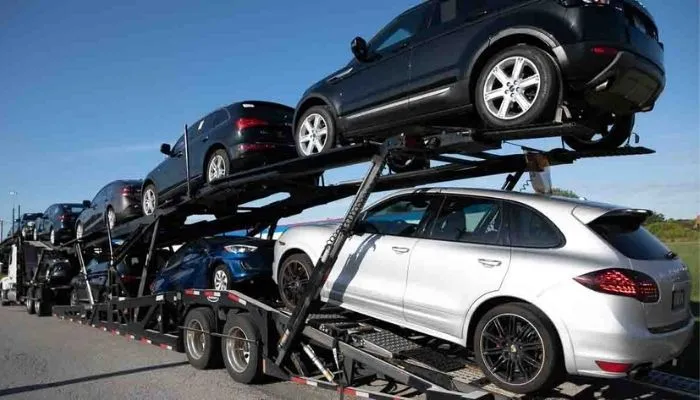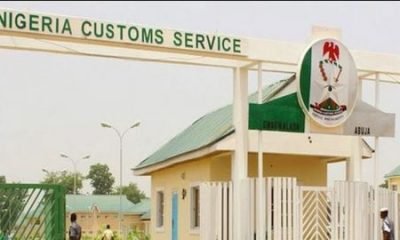Business
60% Nigerians Can’t Afford New Cars – Expert Analyses FG’s Policy On Tokunbo Cars

The federal government has been urged to review its policy on the importation of vehicles into Nigeria considering the masses, Naija News reports.
This is as the acting National President of the Association of Nigerian Licensed Customs Agents, Kayode Farinto, lamented recent hitches encountered with the Vehicle Identification Number (VIN) introduced by the government.
It was observed that since the introduction of the electronic system for the valuation of imported vehicles, the platform has been riddled with controversies that have made vehicles almost inaccessible to ordinary Nigerians.
The PUNCH had carried out deep findings into the situation to examine how the platform has raised duty on imported vehicles by over 100 per cent, among other challenges being faced by importers.
Naija News recalls that the government through the Nigerian Customs Service, in February 2022, introduced the VIN for the valuation of imported cars in a bid to ensure uniformity of duties on imported used vehicles of the same year, company and model.
The system, however, has since generated many controversies as freight forwarders and clearing agents operating in the nation’s maritime sector continue to lament over it, saying it was marred by hitches and inconsistencies.
One of their major concern was that the new system has led to an over 100 per cent increase in duties paid on imported used vehicles, especially those whose models are below 2013.
This is coupled with the weakened naira value against dollars, which has further driven up the prices of vehicles.
At the launch of VIN for electronic valuation of imported vehicles in February, a number of stakeholders voiced their displeasure about the Customs’ objectives while pointing out that the values used did not accurately factor in annual depreciation as required for used vehicles.
A thing to note is that the current exchange rate is also impacting the low importation of vehicles experienced currently. This has made vehicles, which are supposed to be necessities to homes, luxuries.
Speaking on the turn of events, Farinto said it was worrisome that some vehicles were yet to be captured on the VIN platform due to hitches.
He said that the platform was selective in nature, working well with standard chassis vehicles while not performing optimally with non-standard chassis vehicles.
“When the Customs’ VIN was being conceptualised, I was one of those that asked that we have a pilot scheme. But my advice was not heeded by the Customs, which went ahead to begin full implementation. Now, there are some categories of vehicles that have not been captured under the VIN Valuation policy.
“There are some categories of vehicles that have not been factored in under the Customs VIN Valuation policy. Some Mercedes Benz, some ML, some X-Class have not been factored in the VIN valuation policy,” he noted.
Naija News understands that one of the reasons the government had raised the age limit of vehicles from 10 years to 15 years in 2010 was to curb the importation of overaged and outdated vehicles into the country and encourage the use of newer vehicles.
However, the policy seems not to have helped as more than 60 per cent of Nigerians, especially youths, still find it impossible to acquire newer cars.
From all indications, it seems the government is trying to actualise the policy on new vehicles through the introduction of VIN. Some freight forwarders opine that the introduction of VIN for vehicle clearance is an indirect way of phasing out older vehicles as the age limit of vehicles on the platform is nine years (2013).
The Ports & Terminal Chapter Chairman of the National Association of Government Approved Freight Forwarders, George Okafor, told the PUNCH in a chat over the weekend that vehicles below the 2013 model were billed to pay 2013 duties.
“The challenges are that cars from the 2012 model and downwards are still paying the duty of the 2013 model. The ones that are cheaper now is even the duty we pay on the 2013 model. If you bring in a car whose year is lower than 2013, you will be asked to pay for 2013. Cars lower than 2013 will pay the duty for a 2013 model, which makes the payment higher. It is like the government wants to phase out old vehicles, they want to discourage people from bringing in older vehicles,” he said.
Speaking further, Okafor said the challenge was mostly with Mercedes Benz and BMW cars, adding that he was asked to pay over N3m for a car whose duty was supposed to be N650, 000.
He added: “The situation is affecting the clearance of vehicles. Many people are abandoning their vehicles, mainly Mercedes Benz and BMW, because their duties are very high. I have this 2003 Mercedes M-Class we paid almost N3m to clear. The value I got before the arrival of the vehicles was around N650, 000 as an old vehicle. We spent almost over N3m to bring it out of the Customs and the port. The people that contributed money to clear the vehicle are saying that they will sell the car to get their money, even though they may not be able to recover their money fully. I had already collected the duty for N650, 000 before the arrival of the vehicle but the car didn’t enter Nigeria before the introduction of the VIN. So, when the vehicle arrived and the VIN valuation commenced, they said it was N3m. So, you can imagine from N650,000 to over N3m.”
He noted that the situation had forced a lot of people into abandoning their vehicles at the ports, saying that it was the government’s own way of getting rid of older vehicles.
Stressing further, Farinto said it was necessary that the government review the policy, noting that most of the vehicles below 2011 were used for e-hailing business by young Nigerians.
He said: “What I think the government should do is to review the policy. Be it as it may, it is the policy of the Federal Government and you don’t expect the Customs to legitimise illegality. You can’t see 2009 vehicle in the system; the least you can see is 2013.”
According to him, the harsh economy is one of the reasons why older vehicles are flooding the country.
He said: “So, we are now telling them that the policy is 12-year-old. They should bend backwards to 2011 and I think they are working on that. So, if you succeed in bringing in anything less than that, you should be ready to pay the duty of 2013 for a vehicle that is less than the 2013 model. The policy is that private vehicles coming into the country cannot be older than 12 years while commercial vehicles can be up to 15 years.
“It is the harsh economy that has caused older vehicles to litter the country. I am also of the opinion that the government can review that policy so that it can satisfy the interest of the youth, the newly employed and those that are going into commercialisation. This will, at least, make them self-employed. Even if you look at the 2011 model, how many people can afford it? My vehicle is 2010 and it is over N7.5m. So, that is why the government should look at it and review that policy.”












